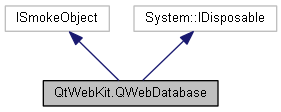|
Qyoto
4.0.5
Qyoto is a C# language binding for Qt
|
|
Qyoto
4.0.5
Qyoto is a C# language binding for Qt
|
The QWebDatabase class provides access to HTML 5 databases created with JavaScript. More...


Public Member Functions | |
| QWebDatabase (QWebDatabase other) | |
| | |
| virtual void | CreateProxy () |
| new string | DisplayName () |
| | |
| new long | ExpectedSize () |
| | |
| new string | FileName () |
| | |
| new string | Name () |
| | |
| new QWebSecurityOrigin | Origin () |
| | |
| new long | Size () |
| | |
| new void | Dispose () |
Static Public Member Functions | |
| static void | RemoveAllDatabases () |
| | |
| static void | RemoveDatabase (QWebDatabase arg1) |
| | |
Protected Member Functions | |
| QWebDatabase (System.Type dummy) | |
Protected Attributes | |
| SmokeInvocation | interceptor |
Properties | |
| virtual System.IntPtr | SmokeObject [get, set] |
The QWebDatabase class provides access to HTML 5 databases created with JavaScript.
The upcoming HTML 5 standard includes support for SQL databases that web sites can create and access on a local computer through JavaScript. QWebDatabase is the C++ interface to these databases.
Databases are grouped together in security origins. To get access to all databases defined by a security origin, use QWebSecurityOrigin::databases(). Each database has an internal name(), as well as a user-friendly name, provided by displayName(). These names are specified when creating the database in the JavaScript code.
WebKit uses SQLite to create and access the local SQL databases. The location of the database file in the local file system is returned by fileName(). You can access the database directly through the QtSql database module.
For each database the web site can define an expectedSize(). The current size of the database in bytes is returned by size().
For more information refer to the HTML5 Web SQL Database Draft Standard.
See also QWebSecurityOrigin.
|
protected |
| QtWebKit.QWebDatabase.QWebDatabase | ( | QWebDatabase | other | ) |
Constructs a web database from other.
|
virtual |
| new string QtWebKit.QWebDatabase.DisplayName | ( | ) |
Returns the name of the database in a format that is suitable for display to the user.
| new void QtWebKit.QWebDatabase.Dispose | ( | ) |
| new long QtWebKit.QWebDatabase.ExpectedSize | ( | ) |
Returns the expected size of the database in bytes as defined by the web author.
| new string QtWebKit.QWebDatabase.FileName | ( | ) |
Returns the file name of the web database.
The name can be used to access the database through the QtSql database module, for example:
QWebDatabase webdb = ...
QSqlDatabase sqldb = QSqlDatabase::addDatabase("QSQLITE", "myconnection");
sqldb.setDatabaseName(webdb.fileName());
if (sqldb.open()) {
QStringList tables = sqldb.tables();
...
}
Note: Concurrent access to a database from multiple threads or processes is not very efficient because SQLite is used as WebKit's database backend.
| new string QtWebKit.QWebDatabase.Name | ( | ) |
Returns the name of the database.
| new QWebSecurityOrigin QtWebKit.QWebDatabase.Origin | ( | ) |
Returns the databases's security origin.
|
static |
Deletes all web databases in the configured offline storage path.
This function was introduced in Qt 4.6.
See also QWebSettings::setOfflineStoragePath().
|
static |
Removes the database db from its security origin. All data stored in the database db will be destroyed.
| new long QtWebKit.QWebDatabase.Size | ( | ) |
Returns the current size of the database in bytes.
|
protected |
|
getset |